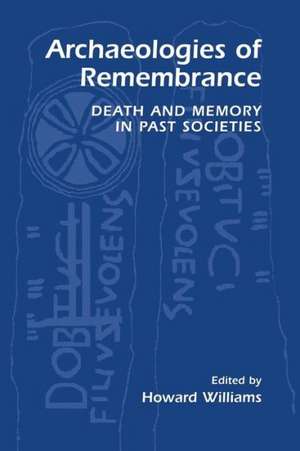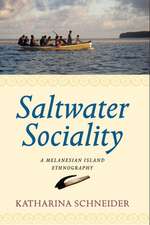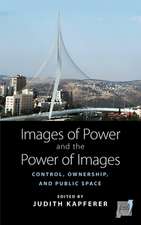Archaeologies of Remembrance: Death and Memory in Past Societies
Editat de Howard Williamsen Limba Engleză Paperback – 19 sep 2012
This innovative new research work focuses upon identifying strategies of remembrance. Evidence can be found in a range of archaeological remains including the adornment and alteration of the body in life and death, the production, exchange, consumption and destruction of material culture, the construction, use and reuse of monuments, and the social ordering of architectural space and the landscape. This book shows how in the past, as today, shared memories are important and defining aspects of social and ritual traditions, and the practical actions of dealing with and disposing of the dead can form a central focus for the definition of social memory.
| Toate formatele și edițiile | Preț | Express |
|---|---|---|
| Paperback (1) | 1212.81 lei 6-8 săpt. | |
| Springer Us – 19 sep 2012 | 1212.81 lei 6-8 săpt. | |
| Hardback (1) | 1220.71 lei 6-8 săpt. | |
| Springer Us – 30 ian 2003 | 1220.71 lei 6-8 săpt. |
Preț: 1212.81 lei
Preț vechi: 1479.04 lei
-18% Nou
Puncte Express: 1819
Preț estimativ în valută:
232.07€ • 242.30$ • 192.07£
232.07€ • 242.30$ • 192.07£
Carte tipărită la comandă
Livrare economică 05-19 aprilie
Preluare comenzi: 021 569.72.76
Specificații
ISBN-13: 9781461348450
ISBN-10: 1461348455
Pagini: 328
Ilustrații: XIV, 310 p.
Dimensiuni: 155 x 235 x 17 mm
Greutate: 0.46 kg
Ediția:Softcover reprint of the original 1st ed. 2003
Editura: Springer Us
Colecția Springer
Locul publicării:New York, NY, United States
ISBN-10: 1461348455
Pagini: 328
Ilustrații: XIV, 310 p.
Dimensiuni: 155 x 235 x 17 mm
Greutate: 0.46 kg
Ediția:Softcover reprint of the original 1st ed. 2003
Editura: Springer Us
Colecția Springer
Locul publicării:New York, NY, United States
Public țintă
ResearchDescriere
How did past communities and individuals remember through social and ritual practices? How important were mortuary practices in processes of remembering and forgetting the past?
This innovative new research work focuses upon identifying strategies of remembrance. Evidence can be found in a range of archaeological remains including the adornment and alteration of the body in life and death, the production, exchange, consumption and destruction of material culture, the construction, use and reuse of monuments, and the social ordering of architectural space and the landscape. This book shows how in the past, as today, shared memories are important and defining aspects of social and ritual traditions, and the practical actions of dealing with and disposing of the dead can form a central focus for the definition of social memory.
This innovative new research work focuses upon identifying strategies of remembrance. Evidence can be found in a range of archaeological remains including the adornment and alteration of the body in life and death, the production, exchange, consumption and destruction of material culture, the construction, use and reuse of monuments, and the social ordering of architectural space and the landscape. This book shows how in the past, as today, shared memories are important and defining aspects of social and ritual traditions, and the practical actions of dealing with and disposing of the dead can form a central focus for the definition of social memory.
Cuprins
Introduction; H. Williams. Building from Memory; V. Cummings. Rates of (Ex)change; C. Fowler. Technologies of Remembrance; A. Jones. Tales from the Dead; M. Williams. Remembering Rome; V.M. Hope. Objects Without a Past? H. Eckardt, H. Williams. Iconoclasm, Belief and Memory in Early Medieval Wales; G. Longden. Memories in Stone; D. Petts. Memory, Salvation and Ambiguity; V. Thompson. Remembering and Forgetting the Medieval Dead; H. Williams. Memories of the Early Medieval Past; B. Effros. Dyster står dösen; C. Holtorf. Index.
Caracteristici
Includes supplementary material: sn.pub/extras












